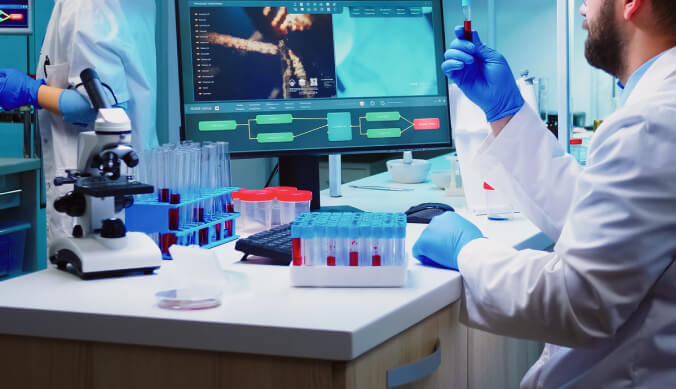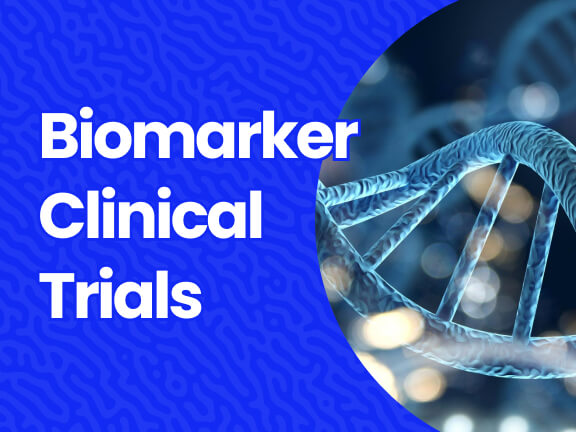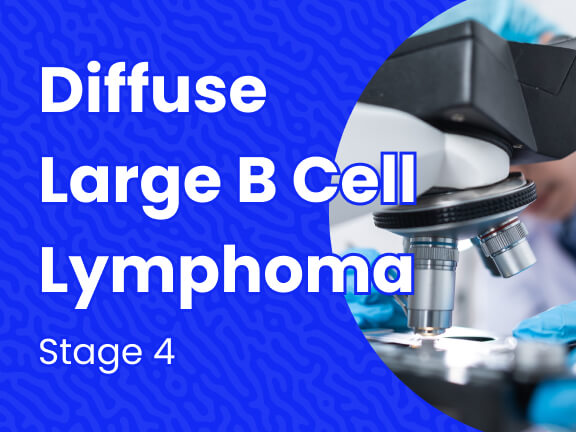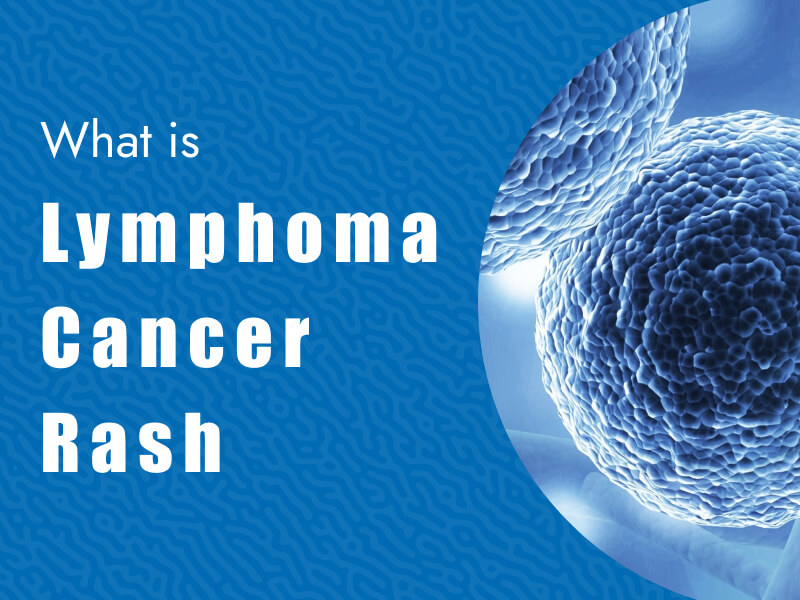Biomarkers are defined as a characteristic that can be measured as an indicator of normal biological processes, pathogenic responses, or responses to an exposure or intervention such as therapeutic interventions. Biomarkers have been studied by scientists to learn more about how and why diseases develop.
Clinical trials are research studies where doctors evaluate new methods of improving the treatment and quality of life for patients with diseases. A Biomarker clinical trial is when the therapy or drug being evaluated in the trial targets a biomarker to treat the disease.
What is a Biomarker in Clinical Trials?

Biomarker clinical trials have the same regulations, parameters, and safety measures as other clinical trials, but the drug or therapy that is being studied targets one or more biomarkers. Patients who choose to enroll in trials can receive cutting-edge treatment and high-quality care under the direction of scientists, doctors, and researchers. Cancer patients can gain access to promising drugs and innovative treatments long before they’re made available to the public.
What Are the 4 Types of Biomarkers?
Not all biomarkers are the same. There are many biomarkers present, but only some of them are known to provide insight on cancer or other diseases. There also several types of biomarkers doctors can identify in the body. Some biomarkers directly affect the behavior of a patient’s tumor while other biomarkers are measured to monitor the body’s reaction to the cancer in areas such as the bone density or blood pressure.
The 4 types of biomarkers include:
- Molecular biomarkers: Can be measured to indicate the presence of diseases. Includes things such as a biopsy, plasma, or cerebrospinal fluid.
- Radiographic biomarkers: Things such as bone density or anything gathered from imaging tests.
- Histologic biomarkers: Detects any molecular or biochemical alterations in the cells, tissues, and fluids. This is reflected in the stage of cancer.
- Physiologic biomarkers: Measures the body’s processes such as heart rate, blood pressure, and body temperature.
What Are the Main Biomarkers?
There are over 26,000 clinically approved biomarkers, but not all of them are beneficial to doctors when treating cancer. Some biomarkers occur in select cancer types more than others. For example, common breast cancer biomarkers include HER2 and FGFR, and common lung cancer biomarkers include MET and ROS1.
Some of the common biomarkers seen in other cancer types are:
- NRG
- JAK1 & JAK2
- BRAF
- ALK
- NTRK
- PI3KCA
- AKT
- And many more
Tumor mutational burden (TMB) is a measure of the gene mutations inside cancer cells, which is determined through genomic testing. The more gene mutations, or the higher a patient’s TMB is, the more likely their cancer cells will be targeted and attacked when given a targeted therapy or immunotherapy
How are Biomarkers Used in Cancer Research?
In drug development and clinical trials, biomarkers may be used to help identify populations for a study, monitor therapeutic response, and identify side effects. However, not all biomarkers are useful in cancer so extensive research is required to develop treatments. Targeted therapies and immunotherapies are typically only available to patients with certain biomarkers, so it is important to get tested to ensure you’re aware of all available treatment options. Targeted therapies are a type of cancer treatment that uses drugs to target specific biomarkers that are involved in the survival and growth of cancer cells. Cancer cells are targeted through the biomarkers, meaning healthy cells are avoided, often leading to less side effects.
Immunotherapies boost the patient’s immune system to fight the cancer. By using biomarkers, doctors are able to identify appropriate candidates that will likely respond to these drugs that are personalized to their immune system. Immune checkpoint inhibitors are immunotherapy drugs that block proteins from binding together, leading to the cell to stop growing and die. These checkpoint inhibitors are able to target specific biomarkers identified in the cancer cells to attack the cancerous cells while avoiding normal cells.
In the context of cancer, the biomarkers in cancer research have 3 characteristics:
- Prognostic biomarkers: Indicates the probability a clinical event will occur in the future such as progression or recurrence of the disease. These biomarkers are tracked using a baseline that may include a background treatment.
- Diagnostic biomarkers: Detects or confirms the presence of a disease in a patient.
- Stratification (predictive) biomarkers: Determines if a patient will likely respond to exposure to a specific drug or therapy.
Each biomarker is studied in each cancer type individually, so developing new approved therapies can be time consuming. The rate of developing these new drugs can be faster if more patients enroll in clinical trials that study targeted therapies and immunotherapies. However, many patients are unaware of biomarker testing and/or clinical trials. Due to a lack of enrolling participants, today some cancer types and biomarkers do not have access to treatments that target biomarkers.
How Do You Identify a Biomarker?
Every patient has a unique genetic makeup and biomarkers, which can influence the effectiveness of certain treatment options. To identify biomarkers, a sample of the tumor tissue or blood is taken and sent to a laboratory to be tested. A list of the biomarkers in the cancerous cells is provided in a report along with any treatments that could benefit your cancer based on which biomarkers are present. This process is called biomarker testing, or genomic testing. Cancer patients with solid tumors or blood cancer can get biomarker testing and is recommended for all patients to have.
Biomarker-Driven Patient Selection for Clinical Trials
Clinical trials are the main source of developing new targeted therapies and immunotherapies, which target biomarkers in cancer. For patients to be eligible for these clinical trials, they need to already have received biomarker testing confirming the trial’s biomarker is present along with the rest of the enrollment criteria. Every clinical trial has unique enrollment criteria, so just having the biomarker present does not mean patients are guaranteed enrollment to their desired trial.
Massive Bio specializes in finding clinical trials for cancer patients who have had genomic testing, as well as other testing such as genetic testing, solid tumor testing, and Next Generation Sequencing (NGS) testing. If you have been diagnosed with cancer and have a specific mutation, we are well-equipped to help you today. Many clinical trials are studying targeted therapies that are designed for specific cancer types. Massive Bio recommends NGS testing for patients to help determine an exact diagnosis. Some mutations found in cancers include:
- BRCA1, BRCA2, AKT1/2/3, NTRK1/2/3
- FGFR, FGFR1, FGFR2, HER2, BRAF, ROS1
- PIK3CA, MET, PTEN, ALK, KRAS, MDM2
- RAD51B, RAD51C, RAD51D, RAD54L
Sources:












